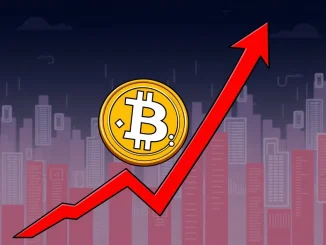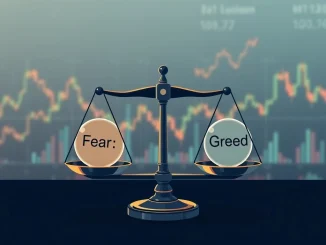
Is a major shift underway in global finance? According to UBS, one of the world’s largest wealth managers, high-net-worth individuals in Asia are strategically repositioning their portfolios. This move is seeing them reduce exposure to U.S. dollar-based investments in favor of alternative assets like gold, cryptocurrencies, and opportunities within China’s markets. This trend highlights the growing importance of Asian wealth in shaping global investment flows and signals a potential change in how sophisticated investors view traditional safe havens versus emerging digital assets.
Why is Asian Wealth Shifting? Understanding the Drivers
The reasons behind this significant portfolio reallocation are multifaceted, driven by a combination of macroeconomic factors and geopolitical considerations. Amy Lo, co-head of UBS Global Wealth Management Asia Pacific, points to rising geopolitical uncertainty and market volatility as key catalysts. These factors often prompt investors to seek assets perceived as more stable or less correlated with traditional markets.
Here are some core drivers:
- Geopolitical Uncertainty: Heightened tensions globally, particularly between major powers, create instability that makes investors wary of assets tied closely to specific political or economic blocs.
- Market Volatility: Fluctuations in global stock and bond markets push investors towards assets that might hold value better during downturns.
- U.S. Dollar Decline Concerns: While the U.S. dollar remains a dominant currency, concerns about inflation, government debt levels, and changing global trade dynamics are prompting investors to diversify away from heavy reliance on the greenback. The potential for a long-term U.S. dollar decline is a significant motivator.
- Search for Alternative Value Stores: Traditional diversification methods are being re-evaluated. Investors are actively seeking assets that can serve as stores of value outside conventional financial systems.
Exploring the New Destinations for Asian Wealth
The flow of capital is moving towards specific asset classes and regions:
Gold: The Timeless Safe Haven
Gold has historically been a preferred asset during times of economic uncertainty or currency devaluation. Its appeal lies in its tangible nature and its history as a reliable store of value across centuries. The renewed interest from wealth management Asia clients underscores its enduring role in conservative portfolio strategies, particularly when confidence in fiat currencies wavers.
Cryptocurrencies: The Digital Frontier
Perhaps the most notable shift is the increasing allocation to cryptocurrencies. What was once considered a fringe asset is now entering mainstream wealth management discussions. Bitcoin, in particular, is gaining traction. Industry players like Galaxy Digital and BlackRock have noted that Bitcoin is increasingly viewed not just as a speculative asset but as a legitimate store of value within global portfolio strategies. This perspective treats Bitcoin as ‘digital gold’ – a decentralized asset with a limited supply, potentially offering a hedge against inflation and systemic risk.
The appeal of crypto investment includes:
- Decentralization: Not controlled by any single government or central bank.
- Limited Supply: Assets like Bitcoin have a capped supply, potentially making them deflationary over time.
- Accessibility: Relatively easy to buy, sell, and transfer globally.
- Potential for High Returns: While volatile, the potential for significant growth remains a draw for high-net-worth individuals seeking higher yields than traditional assets might offer.
China Markets: Renewed Opportunities
Alongside alternative assets, Chinese markets are seeing revived interest. Recent reductions in U.S.-China tariffs have helped to ease some trade tensions, making investments in Chinese equities and bonds more attractive. For Asian investors, China represents both geographic proximity and significant growth potential, offering diversification away from Western-dominated markets.
Comparing Investment Options: Traditional vs. Alternative
This shift highlights a changing perception of risk and value. Here’s a simplified comparison:
| Asset Class | Traditional View | Emerging View (Driven by Current Trends) |
|---|---|---|
| U.S. Dollar Assets (e.g., Bonds) | Safe, Stable, Highly Liquid | Potentially exposed to inflation, debt issues, geopolitical risk; Concerns about U.S. dollar decline. |
| Gold | Traditional Safe Haven, Inflation Hedge | Enduring value, but offers no yield; Price can still be volatile. |
| Bitcoin / Crypto | Volatile, Speculative, Risky | Digital Store of Value, Decentralized Hedge, High Growth Potential, Part of crypto investment strategies. |
| China Markets | Emerging Market Risk, Regulatory Uncertainty | Significant Growth Potential, Geographic Diversification, Improved Trade Relations (due to tariff changes). |
What Does This Mean for Investors and the Global Economy?
The move by Asian wealth managers like UBS reflects a broader trend among sophisticated investors to look beyond conventional frameworks. It suggests a growing acceptance of digital assets and a pragmatic approach to managing risk in an unpredictable world. For the global economy, this shift could potentially lead to a more multipolar financial system, with capital flows diversifying away from traditional hubs.
For individuals considering their own portfolios, this trend from wealth management Asia experts offers insights:
- Diversification is Key: Relying too heavily on a single currency or market carries risks.
- Alternative Assets are Gaining Legitimacy: Gold and cryptocurrencies are increasingly seen as valid components of a diversified portfolio.
- Understanding Risk is Crucial: While opportunities exist, particularly in crypto investment, volatility remains high. Thorough research and understanding risk tolerance are essential.
- Geopolitical Awareness Matters: Global events directly impact investment decisions.
Conclusion: A Strategic Repositioning in an Uncertain World
The report from UBS highlights a significant strategic repositioning by wealthy Asian investors. Driven by concerns over geopolitical stability, market volatility, and the potential for a U.S. dollar decline, they are actively seeking alternatives. Gold provides traditional security, while Bitcoin and other cryptocurrencies represent a new digital hedge and growth opportunity. Simultaneously, eased trade tensions are reviving interest in Chinese markets. This shift underscores the evolving landscape of global finance and the increasing role of alternative and regional assets in sophisticated Asian wealth management strategies. As this trend continues, it will be fascinating to observe its long-term impact on global capital flows and the perception of value in an increasingly interconnected, yet uncertain, world.



